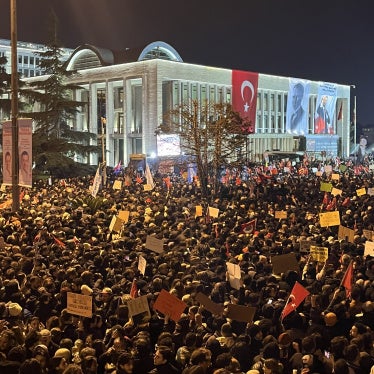Human Rights Watch called on the government of Turkmenistan for a full investigation into the death of political prisoner Khoshali Garaev.
Turkmen officials claim that on Thursday evening, after an alleged fight with other inmates, prison authorities reportedly transferred Garaev to solitary confinement. On Friday morning, he was found dead in his cell, allegedly by hanging.
Garaev is survived by his wife, Sona Ballyeva, and three young children. Ms. Ballyeva dismissed the government's allegation that Garaev committed suicide. She reported to Human Rights Watch that when she visited Garaev in June, "he was used to being in solitary confinement. . . . [H]e was in good health, physical and mental. He cheered me up, saying he would fall under the golden amnesty declared by the president of Turkmenistan, and that the whole family would greet the New Year together. Moreover, my relatives received a letter from him on September 6, saying he was alive and well, that everything was fine, and that he was hoping to be out by December."
"The circumstances surrounding Garaev's death are extremely suspicious," stated Holly Cartner, executive director of Human Rights Watch's Europe and Central Asia division. "The Turkmen government has a poor track record with the truth, and from the beginning fabricated outrageous charges against Garaev. So we have no reason to believe its version of Garaev's death."
Garaev was linked with former Turkmen vice-president Avdy Kuliev, an archrival to President Saparmurad Niyazov, who currently lives in exile. In 1994, Turkmen security forces arrested Garaev, a Russian citizen, in Uzbekistan. He was brought to Turkmenistan without the formality of an extradition procedure. In 1995, a Turkmen court sentenced him, together with Mukhammetkuli Aimuradov, to twelve and fifteen years, respectively, in a maximum-security labor colony on trumped-up charges of "planning the violent overthrow of the constitutional order of Turkmenistan...and the armed seizure of power." During the investigation Turkmen authorities reportedly severely mistreated Garaev and Aimuradov and prevented them from contacting their lawyers, or from examining evidence or question witnesses against them.
In November 1998, the Turkmen government launched new charges against Garaev and Aimuradov, including conspiracy to assassinate the president. The new charges allegedly stemmed from an incident in prison officials falsely told Garaev that his young son had died, causing Garaev to attack the prison guards in a rage. After an international outcry underscored the absurdity of the assassination charges, a court sentenced Garaev to ten additional years on charges of attempted escape.
"Garaev was political prisoner — he should never have been in prison in the first place," Ms. Cartner continued. "Turkmenistan employs no other way of dealing with dissent other than jailing dissenters."








